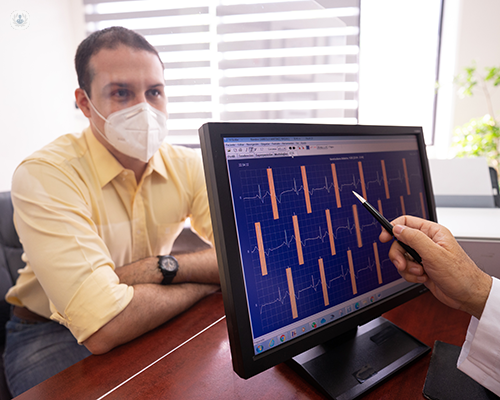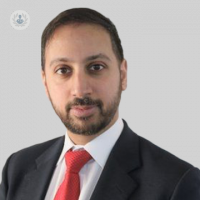What happens in the heart when a heart rhythm disturbance is present?
Written by:Heart rhythm disturbances, also known as arrhythmias, are abnormal or irregular heartbeats caused by faulty electrical signalling in the heart.
Here to provide an expert insight into heart rhythm disturbances, including their symptoms, diagnosis and treatment, is Dr Husain Shabeeh, highly skilled consultant cardiologist and cardiac electrophysiologist.

What is happening inside the heart when a rhythm disturbance is present?
The heart is a complex structure with heart muscle, valves, blood supply through arteries and veins, but also electrical tissue.
The electrical tissue performs its own conduction in the form of an electrical signal, which is inherent to the normal function of the heart. The signal travels from the chambers at the top of the heart (the atria) to the chambers at the bottom of the heart (the ventricles).
Heart rhythm disorders can cause the heart to beat irregularly, have extra beats, beat too fast, or beat too slowly.
Within these, there are some heart rhythm disorders that can cause the heart’s rhythm to slow down or speed up to a point where it becomes dangerous. These more dangerous heart rhythm disturbances can prevent the heart from pumping blood properly.
How are heart rhythm disturbances usually detected?
Heart rhythm disturbances can be detected in various ways and often, but not always, given the patient symptoms.
Fast heart rhythm disturbances (that cause the heart to beat too fast) often produce, for example, palpitations, breathlessness, chest pain or lethargy. Slow heart rhythm disturbances (that cause the heart to beat too slowly) can produce breathlessness, lethargy, dizziness, light-headedness, fainting or collapsing.
These are the most common symptoms involved with heart rhythm disturbances. If any cause concern, then medical help should be sought.
Can a heart rhythm disturbance be a sign of something serious?
Heart rhythm disturbances can indicate that something is happening inherently in the heart or that there is a problem with the heart, the muscle, the arteries or the valves themselves. A detailed assessment would include a history, a physical examination and then potential investigations, including commonly an electrocardiogram. This is an electrical reading or tracing of the heart.
Some common fast heart rhythm disturbances are also actually benign: they can make you unwell, but they will not cause damage to the heart. There are, however, rhythm disturbances that can be a sign of something serious or that can pose a problem for the heart.
Hence, it is extremely important to get checked out by your doctor if you feel that something is not right with the heart.
When does a heart rhythm disturbance require treatment?
Treatment for heart rhythm disturbances generally focuses on managing symptoms. For heart rhythm disturbances that can be dangerous, treatment focuses on managing that risk as well.
If you have a heart rhythm disturbance that causes symptoms such as palpitations, for example, the source of the symptom can sometimes be a simple circuit which is not life-threatening but which can make you feel unwell. However, it is very important to ensure a diagnosis is made of what type of heart rhythm disturbance is causing your symptoms, before appropriate management is discussed.
What are the most common treatments for a heart rhythm disturbance?
There are various treatments available, depending on the type of heart rhythm disturbance.
Fast heart rhythm disturbances (that cause the heart to beat too fast) are usually treated with medication. These slow the heart’s rhythm down or terminate any abnormal circuit that occurs at the time of the palpitation. Procedures, such as ablation, can be used to get rid of the extra conduction tissue that is causing the problem too.
Slow heart rhythm disturbances (that cause the heart to beat too slowly) can be managed, for example, with the use of cardiac devices, such as pacemakers. These increase the heart’s rate and prevent it from slowing down.
Also, for example, some dangerous heart rhythm disturbances (that inhibit the normal function of the heart) require either shocks to the heart to take it out of its dangerous rhythm or fitted defibrillators under the skin to shock the heart back to normal.
Can lifestyle changes improve a heart rhythm disturbance?
The most common heart rhythm disturbance is atrial fibrillation. There is clear evidence that weight management and healthy lifestyle reduces its risk and burden.
Thus, lifestyle changes, such as weight management, regular exercise, and healthy eating, are incredibly important to reduce not only your risk of having a heart rhythm disorder but also your cardiovascular risk.
If you have symptoms of a heart rhythm disturbance, and wish to seek expert treatment and management for it, do not hesitate to visit Dr Shabeeh’s Top Doctors profile today.


